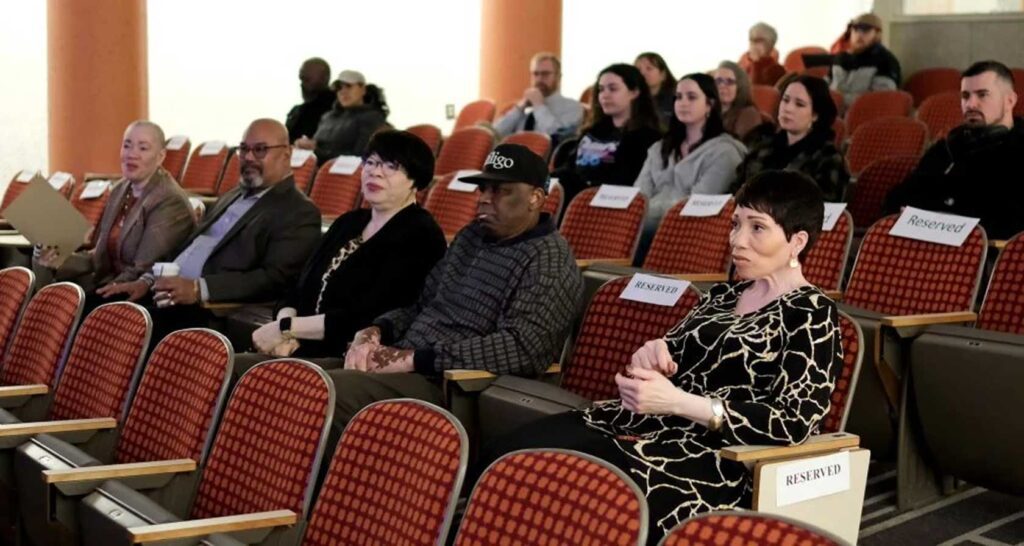
Valarie Molyneaux’s vitiligo diagnosis in 2002 turned her life upside down.
“I drove my car to Jamaica Pond and wanted to drive it in,” said Molyneaux, a Hyde Park resident.
Vitiligo is an autoimmune disease. With this condition, an overactive immune system attacks cells called melanocytes. These cells normally create the melanin that gives skin its pigmentation.
As the melanocytes are destroyed, however, the skin begins to lose its coloring.

Hyde Park resident Valarie Molyneaux poses next to a promotional photo for the documentary “More Than Our Skin” at its Feb. 22 premiere. PHOTO: ANDREW CUNNINGHAM (FITCHBURG STATE UNIVERSITY
Although how a person gets vitiligo is still in question — researchers think it’s a mix of genetic and environmental factors — the condition is not contagious. Those with the disease have it for life.
Learning that there is no cure is what sent Molyneaux to Jamaica Pond 22 years ago.
“But I said no, and I heard a voice that said, ‘You can do something about this,’” she said.
Molyneaux later created the national organization VITFriends, connecting and supporting people with vitiligo.
Molyneaux’s story is one of five featured in a new documentary by Leominster-based Hull Bay Productions that premiered at a Feb. 22 screening at Fitchburg State University. The film, “More Than Our Skin,” follows five women across the country, grappling with and coming to terms with having vitiligo.
“We want to be able to have people look at vitiligo differently,” said the film’s producer and director, Tonia Magras, “[to maybe] be touched by this idea of humanity, that we’re all the same. The only thing that really distinguishes us is what’s on the outside.”
Some of the women featured in the film attended the premiere. They emphasized the need for better education for people with vitiligo, and for those without.
“People like to stare, and you don’t know what they see,” said Patricia Rossy, a New York resident featured in the film. She said that kind of interaction can deal a blow to her psyche. “While they’re staring at you, they’re writing a book, they’re writing a story about you, and they don’t even know you.”
Misconceptions and stigma have surrounded vitiligo for thousands of years, said Dr. John Harris, a leading dermatologist featured in the documentary, pointing to references to the disease in Indian texts from thousands of years ago.
“It’s an autoimmune disease, it’s a real thing, but at the same time, it’s also not dangerous,” Harris said. “It’s okay to talk to people and understand them. I think that the documentary does a good job of telling both those sides.”

At the Feb. 22 premiere of the documentary, Tonia Magras, producer and director, takes a selfie with Patricia Rossy, whose story was featured in the film. PHOTO: ANDREW CUNNINGHAM (FITCHBURG STATE UNIVERSITY
People with vitiligo often face unfounded concerns that the condition is contagious. Molyneaux recalled an incident at a grocery store. When she went to pay for her items, the cashier asked her to set the money on the conveyor belt rather, instead of handing it over directly.
The new film comes as vitiligo receives increased medical and legal attention in recent years. In 2022, a skin cream called Opzelura became the first prescription treatment for vitiligo approved by the U.S. Food and Drug Administration.
Harris, who runs the Vitiligo Clinic and Research Center in Worcester, is among the researchers investigating possible root causes of the disease. He is working on a study to better understand genetic and environmental factors that play a role in the disease.
Over the next five years, his research team will collect skin, blood and saliva samples from people with vitiligo and their family members who do not have the disease, to record genetic information and possibly identify events that impact the severity of the disease.
“If we follow them, and we learn about them, and we study their DNA and their blood, we can better understand what causes it,” Harris said. “That’s one step closer to a cure. It’s another step closer to prevention.”
Proposed legislation at the Massachusetts State House would bring greater attention and protections to people with vitiligo. The proposal includes requiring insurance companies cover the disease, its treatments and the mental health impacts it can have.
“This to me is an equity issue. This is an issue of fairness,” said one of the bill’s sponsors, Rep. Rob Consalvo, who represents the 14th Suffolk district and is one of the lead sponsors of the bill H.976. “This will recognize that vitiligo is, in fact, an autoimmune disease and not just a skin condition, and will give it the resources and treatment that people need to be able to address this issue.”
If the bill does not pass on its own, Consalvo said he hopes to incorporate it into broader health care legislation.
In January, “More Than Our Skin” was named a finalist at the New York International Film Awards. The film is set for release in March, available on demand through the project’s website, morethanourskin.org. But Magras hopes to show it at film festivals and is seeking a distribution deal to release the film on a streaming service.






